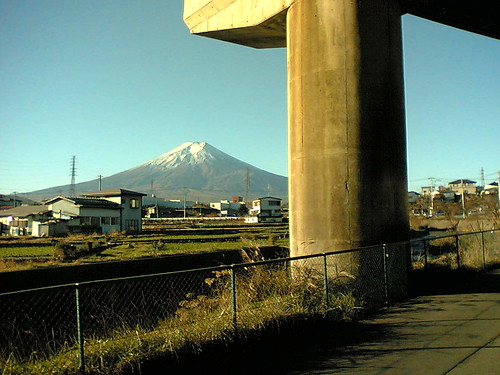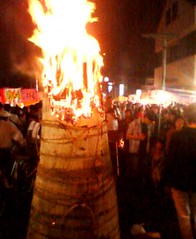That's right, it is up to all of us to stop 温暖化, global warming, as I was reminded by one of my students this afternoon during the daily raid on dirt in the school called soji 掃除. In Japan, students are resposible for cleaning their school. Depending on how I feel on any particular day, I take soji as a chance to practice yelling in Japanese. Nothing gets laughs from the students faster than me trying to be an authority figure. The students don't like cleaning particularly, and I don't blame them. Everyday it is the same routine of sweeping and moping the floors. Except for bathroom duty where they get to scub the toilets and floors, there is little change in soji duties all over Japan. Mopping is done with small towels by hand using both hands and pushing in long stretches across the floor. During soji the students' duty becomes to complain about soji, and the teachers job is to prod them on.
It is cold here in Fujiyoshida. It just snowed the first time of the year yesterday. I was in Tokyo taking the 2kyuu
JLPT test, and it was cold and rainy there too. What else can you expect from winter? I think I passed the test. I only have to score above 60%, but I think I passed. That is a good thing. At the end of the test, the administrators in our room of 98 test takers asked who had the alarm that went off in the middle of the exam. They went to great lengths to inform us how that was a detriment to our test taking and that the person responsible should fess up. I didn't hear the alarm, nor did most people in the room. One guy commented he thought he heard it from somewhere behind him (I think it was him). They let us sit for about 10 minutes to see if someone would fess up for this enormous crime, and when nobody did they finally let us go. They were serious, I was trying not to laugh. Sometimes, be warned, even if you turn you cell phone all the way off, if the alarm is set, the phone will turn itself on and the alarm will go off. A cell phone tucked away in someone's bag most likely turned itself on and beeped its alarm.
What? That was really the most interesting thing that happened at the test. It was a test. I've got to write about something in this blog...
 The begining of winter.
The begining of winter.Last week I finished an Ethics 道徳 class at the local elementary school for some 6th graders. I was interviewed for my perspective on Japan as a foreigner. The class started off with a discussion about voicing opinions. In American schools, teachers stress the importance of being able to have, speak, and write individual opinions. Personal opinions are important to get the students to think and be active in class. In Japanese classes, listening to others and mutual agreement is stressed in order to preserve the harmony of the group. Thus, Japanese students are quiet and reserved where American students speak their mind.
(Annie Milner uses bullets in her blog "I Love That Story", which I thought was pretty cool, so I am going to give it a try too:Pros about the Japanese method of discussion:
-Everyone tries to reach a mutually beneficial agreement.
-Nobody is left out.
Pros about the American method of discussion:
-Room for new and exciting ideas.
-Freedom to express your ideas.
Which method is correct? The Japanese students in class vote, and the result is about half and half. At this point I come in and explain my experience
(applause...gasp...woah, he is tall).As a foreigner the Japanese group mentality is striking. Japanese try to be aware and considerate of everyone around them. Americans are more individualistic.
Both the American way of discussion and the Japanese way of discussion are different methods of resolving an issue or issues. Compared to Japan, America has many debates and elections. As Americans it is our responsibility to be informed and educated. Americans represent cultures from all over the world. Japan is traditional, and (very) arguably ethnically similar. Among Japanese it is presupposed that most others are going to look, dress, and think similarly. Thus a need to voice opinions does not exist as in America, where so many people from so many different backgrounds may not understand each other.
To summarize my experience in Japan I answered three questions:
1. Why is Japan cool?
2. How is Japan different from America?
3. What have I learned?
1. Japan is cool to Americans because it is traditional. America lacks the sense of history that Japan has. My ancestors came to America to get away from traditions that they didn't like to the loss of a deep culture to call our own. Out country will always and forever be forming and re-melting. Japan is comparitively molded, and has been for over 1500 years. Japan has events like "Hi-Matsuri, 火祭り”the Fire Festival here in Fujiyoshida where crowds line the streets late in August to watch 2 meter tall bound towers of wood burn. The burning is supposed to appeal to the goddess of Mt. Fuji who supposedly will then not allow the volcano to errupt this year. Japan also has Budoo, martial arts derived from the strict nomenclature of the samurai class: Karate 空手, Aikido 合気道, Judo 柔道, Kyudo 弓道, Kendo 剣道, and a range of other martial arts developed and still practiced in traditional forms handed down from sensei to sensei. Then there is Japan's long history, revealed for example, by a trip to Kyoto where hundreds of buddhist temples and shinto shrines from the past still exist. The traditional culture resulting from a deep history gives Japan a draw and mysterious appeal to foreigners.

Fujiyoshida's "Hi-Matsuri". The Fire FestivalJapan has a modern culture as well. Look up the words
Keitai,
Karaoke,
Manga,
Anime, and
Warmlet to learn about everyday Japanese modern culture.
2. The biggest difference Japan has from America is Japan is small and crowded. I remember getting onto the last train on the Seibu Shinjuku line in Tokyo on my way home late one night. Every car of the 15 car train was packed with people hanging on to the door frames so as not to get nudged out before the doors would close. My friend and I shoved our way inside and by the time the doors closed several minutes later we had been pushed to the center of the car by at least 20 more people cramming their way inside behind us. As the train slowly left the station rocking back and forth, I found that sometimes my feet were not touching the ground and I was supported by the people squished in all around me. That was a crowded train, but to Tokyo-ites crowded trains are a way of life. Yet another example is me hitting my head upon exiting the office of the superintendent of the board of education here in Fujiyoshida upon first meeting him and recieving my "certificate of employment." Anyone who has worked in a Japanese office soon forgets the meaning of "personal space." Offices are small, door frames are small, cups of coffee and chocolate snacks are small too.
Another large difference is the Japanese language. Not just words and grammar, to learn the Japanese language one must learn the culture, and to learn the culture one must learn the language. In Japanese, whenever you speak you must decide how politely to speak. Politeness level is imbedded in every sentence. For those studying Japanese, check the difference between da, desu, and degozaimasu, three words meaning the same thing, loosely "it is", but having complete differenct nuances of politeness. There is also "Kimari Monku", set phrases that have a particular time and place that they are used, such as Otsukaresama, Itadakimasu, Gochisousama, Tadaima, Okaeri, etc. (Good work, Thanks for the food, That was good food, I'm home, Welcome home, etc. please excuse my berevity). Then there is Kanji. Over 10,000 characters imported from China to use in the Japanese written language. The Japanese government publishes a list of approximately 2000 kanji (joyo kanji) for use in government, business, and the media. The other 8000 kanji anyone is free to use for unofficial business, but the government warns about misinterpretation. Most high school students can read a newspaper by the time they graduate, most. (Actually Japan has one of the highest national literacy rates).
Being a foreigner is different. I am tall, I do not have straight black hair, I have a "tall nose." I have lived in a foreign country (America), thus I know about "the outside," and probably don't know how to use chopsticks.
3. My English has changed a little. I speak slowly and articulate without thinking about it. I will say silly things like "I am going to the store by car," instead of "I am driving to the store." I have learned many things about Japan and America by living in Japan and getting a different perspective. America is a wonderful country and is relatively more free than other countries in our thoughts and actions. However, we have a huge responsibility in that freedom to educate ourselves. I have learned much about myslef too. Ask questions, feel free to make mistakes, challenge your fears, and be patient.
As for Japan, I have one main message: Don't close up. Japan is an amazing place that has much to share with the rest of the world. Throughout history though, Japan's main problem has been to close itself off from the rest of the world. Japan's work for the next century will be creating and maintaining international ties.
I think the 6th graders got it. Maybe some of them will grow up to be experts on how to stop global warning.

